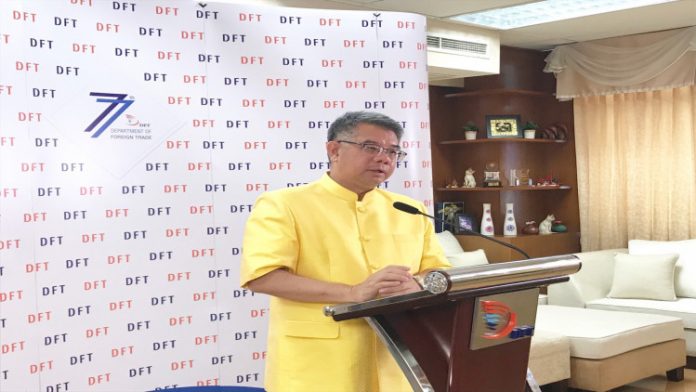BANGKOK, 2 May 2019 (NNT) – The Department of Foreign Trade has unveiled the gross value of Thailand’s cross-border trading with immediate neighboring countries during this year’s first quarter has amounted to 342.63 billion baht, accounting for a 1.86% increase with Malaysia as the largest cross-border trading partner, followed by Laos and Cambodia. Besides, Thailand’s cross-border trading with other countries through the immediate neighboring ones has seen southern China as the largest trading partner, followed by Vietnam and Singapore.
Department of Foreign Trade Director General Adul Chotinisakorn said Thailand’s cross-border trading with immediate neighboring countries during this year’s first quarter has amounted to 342.63 billion baht, accounting for a 1.86% increase and including 192.29 billion baht in export goods, accounting for a 0.49% increase, and 150.33 billion baht in import goods, accounting for a 3.66% increase. Thailand has earned 41.95 billion baht in trade surplus.
The combined value of cross-border trading with four immediate neighboring countries has accounted for 279.53 billion baht, marking a 0.18% increase, including 159.88 billion baht in export goods, marking a 1.95% drop, and 119.65 billion baht in import goods, marking a 3.17% increase. Thailand has enjoyed 40.23 billion baht in trade surplus whereas the combined value of Thailand’s cross-border trading with three other countries through the immediate neighboring ones has amounted to 63.09 billion baht, accounting for a 10.03% increase, including 32.40 billion baht in export goods, marking a 14.57% increase and 30.68 billion baht in import goods, marking a 5.61% increase. Thailand has earned 1.72 billion baht in trade surplus.
Malaysia has become Thailand’s largest cross-border trading partner with 139.63 billion baht in combined trade value, accounting for 0.39% increase, and including 67.48 billion baht in export goods, accounting for a 6.16% drop, and 72.14 billion baht in import goods, accounting for a 7.39% increase. Myanmar has become the second largest cross-border trading partner with 49.64 billion baht, followed by Laos with 48.21 billion baht and Cambodia with 42.03 billion baht in combined trade value. Thailand’s cross-border trading through Laos has seen southern China as the largest trading partner with 27.17 billion baht, accounting for 50.51% increase, including 9.74 billion baht in export goods, accounting for a 42.58% increase and 17.42 billion baht in import goods, accounting for a 55.35% increase, followed by Vietnam with 18.72 billion baht and Singapore with 17.19 billion baht.
The Departement of Foreign Trade has continually accelerated the border trading promotion and special economic zone development such as YEN-D Program, Four Border Regions Trade Expo and seminars and business matching sessions in the course of trade and investment promotion for border entrepreneurs and special economic zone development.
During April 26 and April 28, the department has organized a border trade expo in Su-ngai Kolok district of Narathiwat to stimulate the three border provinces’ economy. The trade expo featured southern Thailand’s outstanding products and Malaysia’s quality products as well as business matching sessions. Malaysia has immediately placed over four million baht in purchase orders for Thai goods with another 65 million baht expected to follow within a one-year time.
Those goods included curry ingredients, burger beef, cosmetic products and deep-fried fish paste. Besides, the Thai and Malaysian public and private sectors held a local-level meeting and agreed to promote Halal food and cross-border tourism in Kelantan and Terengganu, among other destinations.
During March 31 and April 2, the department has led a delegation of SME entrepreneurs in Thailand’s border provinces with Myanmar to a business matching session and knock-door visit to major Myanmar modern traders who have agreed to co-invest with Thai entrepreneurs and start-up businesspersons and to open factories in Myanmar for the manufacturing of seasoning goods and rubber products for which the department has planned to provide continual support.



